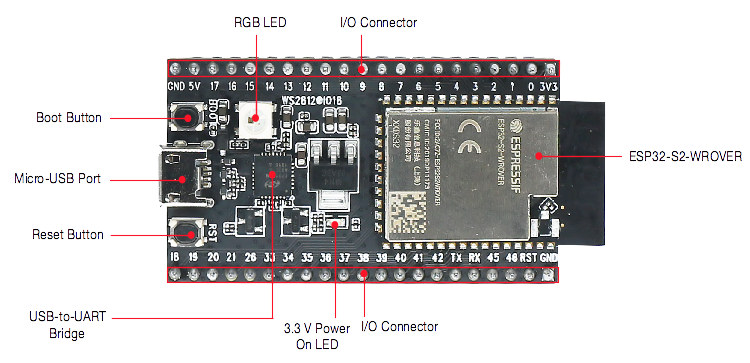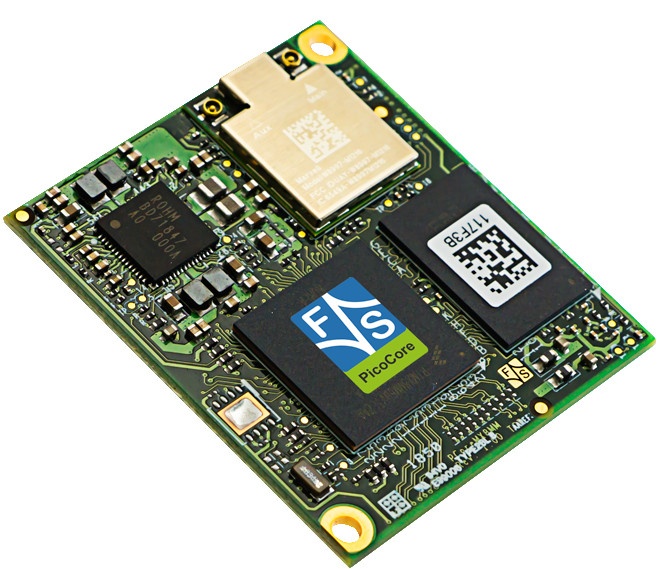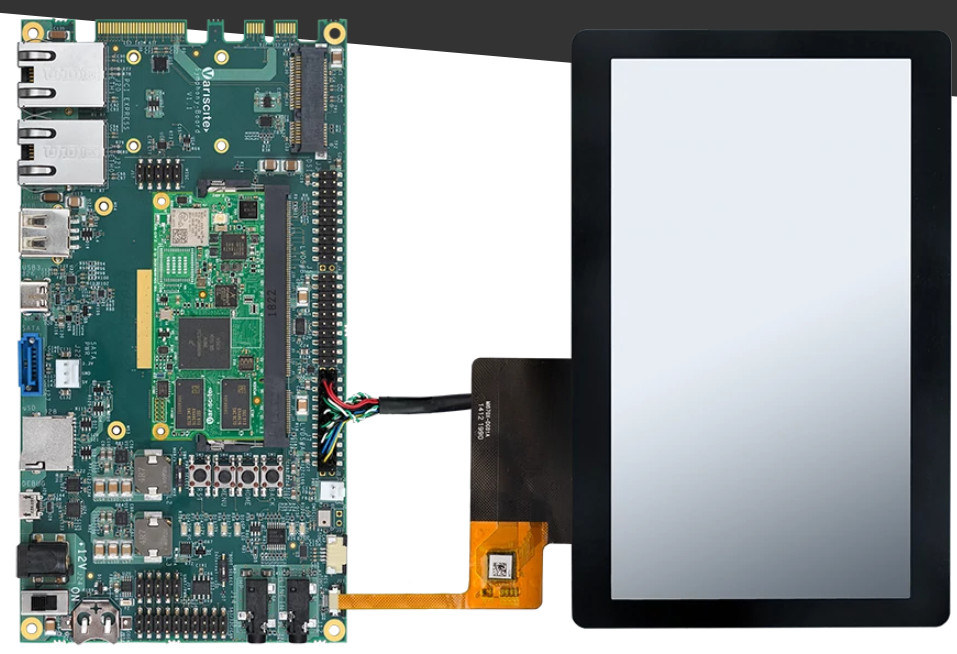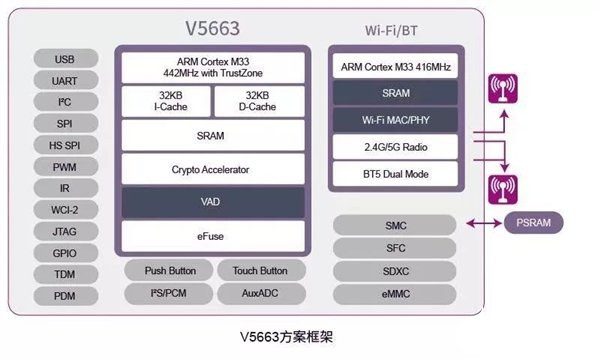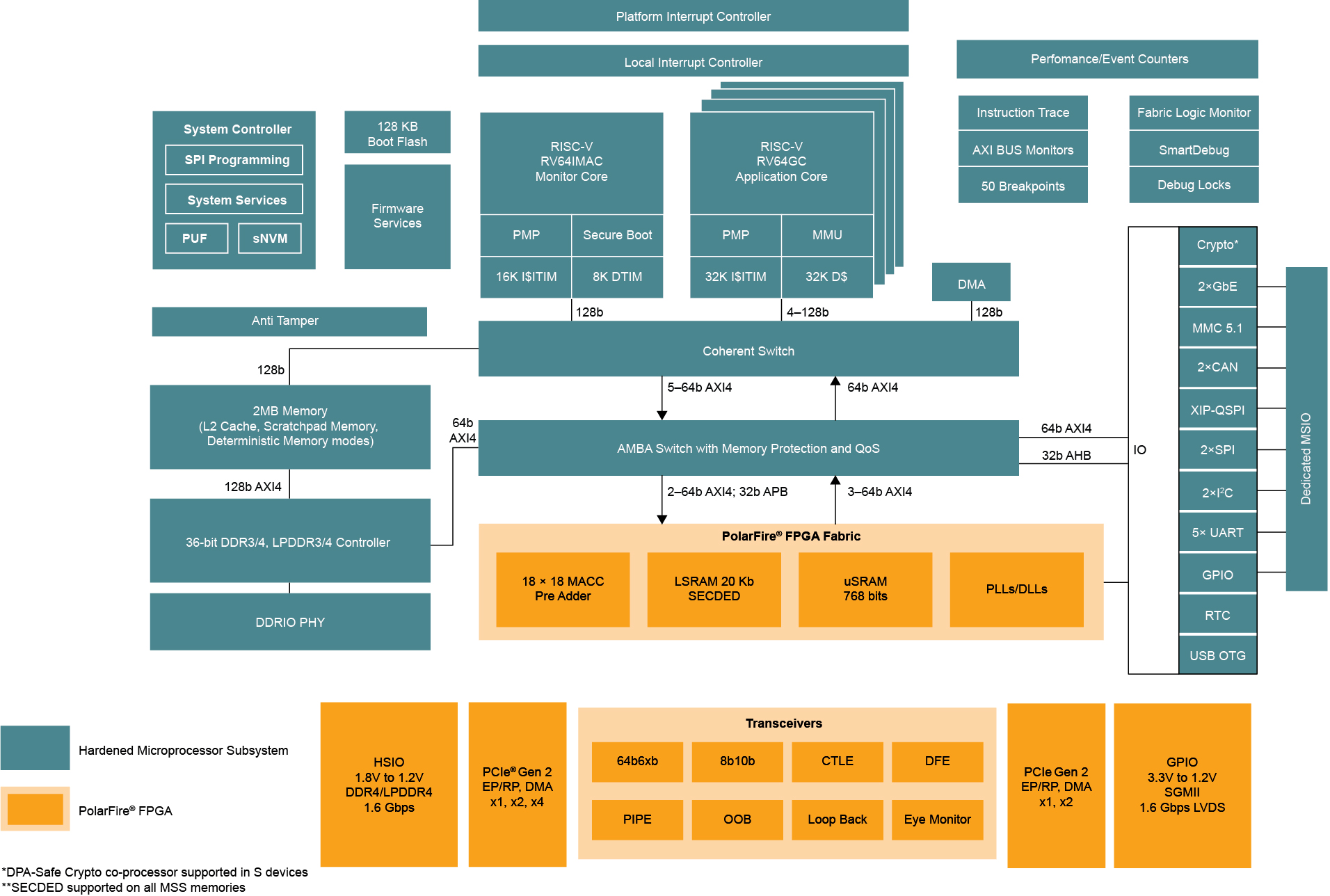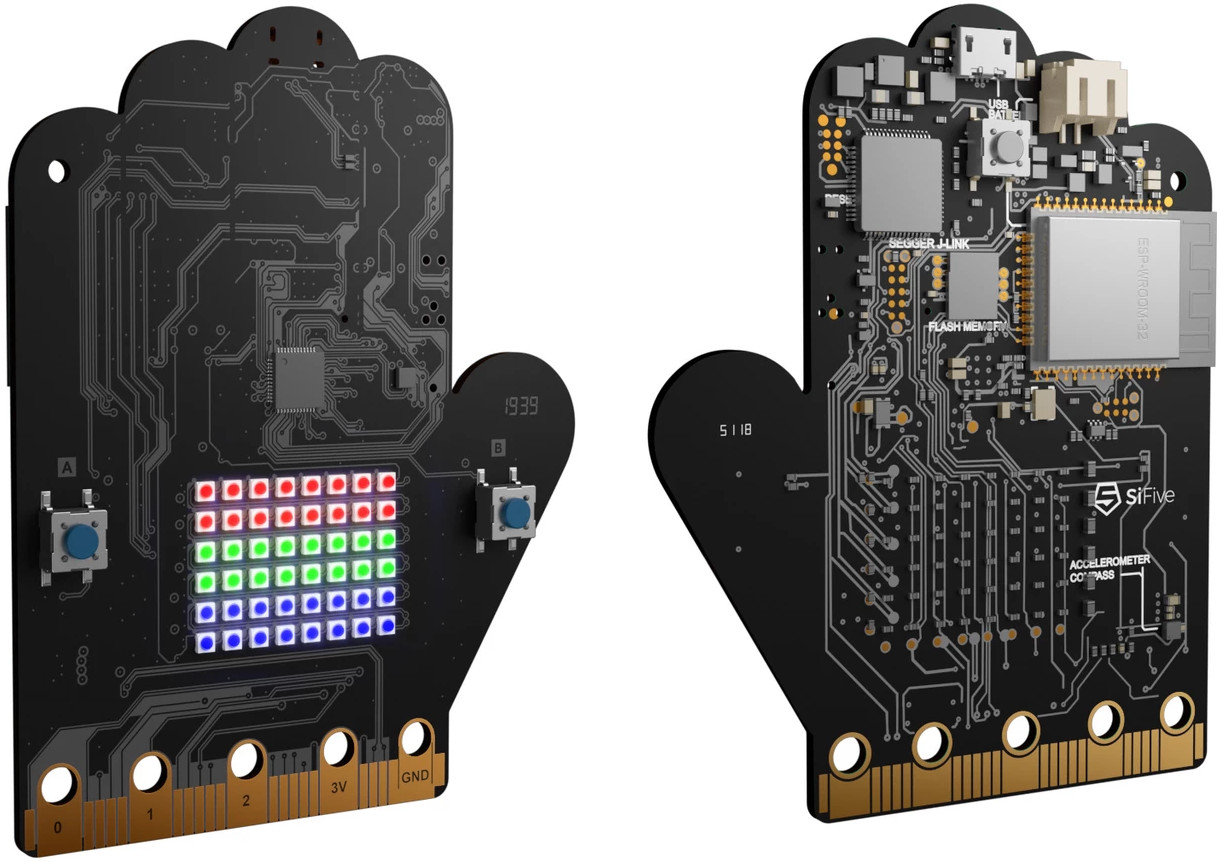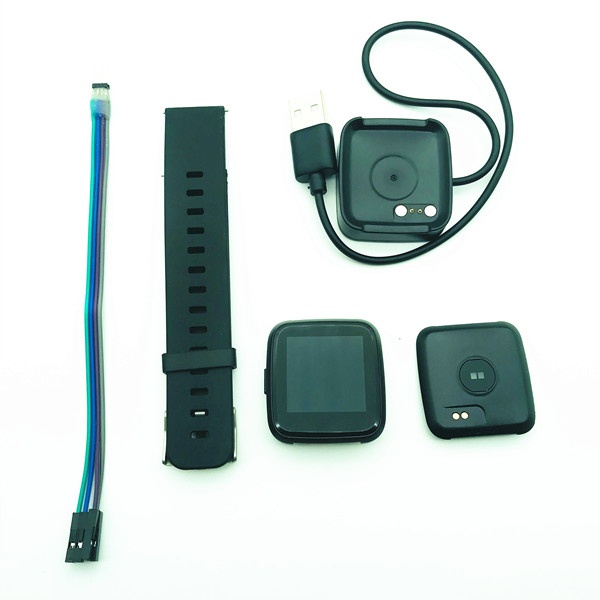Espressif ESP32-S2 WiFi SoC mass production started at the end of February 2020, and soon enough we started to find ESP32-S2 SoC and modules for $1 to $2 on sites like Digikey, but so far we had not seen ESP32-S2 development boards for sale. The good news is the breadboard-friendly ESP32-S2-Saola-1 development board has started to show up for $8 on resellers such as Mouser and Digikey albeit with a lead time of 8 to 12 weeks. ESP32-S2-Saola-1 specifications: Supported modules – ESP32-S2-WROOM(-I) & ESP32-S2-WROVER(-I) with 4 MB SPI flash and for ESP32-S2-WROVER modules only, 2 MB PSRAM USB – 1x Micro USB port for power and programming / debugging via USB-to-UART bridge Expansion – 2x 20-pin I/O headers with SPI, I2S, UART, I2C, touch sensors, PWM, etc… Misc – Boot and reset buttons, RGB LED, 3.3V power on LED Power Supply (3 methods) 5V via Micro USB port (default) […]
PicoCore MX8MN is a Tiny NXP i.MX 8M Nano Computer-on-Module
The PicoCore MX8MN Nano carries the NXP i.MX 8M Nano F&S Elektronik Systeme has announced the development of the smallest i.MX 8M based CoM yet: the PicoCore MX8MN Nano. Previously we had reported on the Congatec Conga-SMX8 Nano which was a fairly small CoM compliant with SMARC 2.0 standard. The PicoCore MX8MN is based on the NXP i.MX 8M Nano CPU with 1 to 4 Arm Cortex-A53 cores and a Cortex-M7 real-time core. The Nano is set to carry up to 8GB RAM and 32 GB eMMC, with optional WiFI/BT and support for -40º C to 85º C temperature ranges. Similar to Predecessor The PicoCore MX8MN Nano is very similar in structure to the PicoCore MX8MM Mini CoM, but with a different i.MX 8M Mini processor featuring the same Arm Cortex-A53 cores, but the Cortex M4 real-time core is changed to a more powerful Cortex-M7 core in the MX8MN Nano. […]
XMOS launches Xcore.AI, a scalable AI processor for the Edge
XMOS, known for its high-performance voice interfaces, is joining the AIoT bandwagon with the announcement of the Xcore.ai, a flexible and economical processor delivering high-performance AI, DSP, control, and I/O’s in a single device. IoT and AI have been one of the most trending topics and fields in the last decade. Both areas have seen large innovations in between them. Deep neural networks have become better, IoT deployment cost has also been greatly reduced, and most importantly, they both have a significant impact on multiple industries. An interesting trend recently is the emergence of applications merging AI and IoT together to form so-called AIoT applications. IoT will be the digital nervous system, while AI will become the brain that makes all the critical decisions which will control the whole system. AIoT has led to the development and deployment of what we call AI processors or AI modules that can be […]
Variscite Introduces i.MX 8M Mini and Nano SoM’s, Symphony Carrier Board
NXP i.MX 8M Mini and i.MX 8M Nano are lower cost and lower power variants of NXP i.M 8M processors manufactured using a 14nm FinFET process, and cutting some features such as HDMI and embedded DisplayPort, or hardware video decoder. NXP i.MX 8M Mini has been announced for over two years, so we’ve already written about many boards and systems-on-module (SoM) including Boardcon EM-IMX8M-MINI SBC, TechNexion XORE LGA SoM, or Congatec conga-SMX8-Mini SMARC 2.0 module among others. NXP i.MX 8M Nano is more recent, and we only covered a few announcements so far namely iWave Systems iW-RainboW-G34M-SM SoM and Conga-SMX8-Nano SMARC 2.0 computer-on-module. There’s now at least a third company working on a “Nano” module with Variscite announcing VAR-SOM-MX8M-NANO SoM together with a “Mini” version called VAR-SOM-MX8M-MINI, and Symphony carrier board and development kits. VAR-SOM-MX8M-MINI & VAR-SOM-MX8M-NANO Modules Both modules are part of Variscite VAR-SOM Pin2Pin family, and share the […]
UNISOC V5663 Arm Cortex-M33 AIoT SoC Comes with 802.11 b/g/n/ac WiFi 5, Bluetooth 5.1
UNISOC has launched a new processor for AIoT (Artificial Intelligence + IoT) applications with V5663 dual-core Cortex-M33 processor, supports for dual-band WiFi 5, Bluetooth 5.1, and audio features such as a voice activity detector and microphone array support which should make it ideal for smart speakers, and other smart audio applications. UNISOC V5663 WiSoC specifications: CPU Arm Cortex-M33 processor @ 442 MHz with TrustZone, 32KB I-cache, 32KB D-Cache for application code Arm Cortex-M33 processor @ 416 MHz for WiFI and Bluetooth Memory – Built-in SRAM + external PSRAM interface Storage – eMMC, SDXC interfaces Connectivity – Dual-band 802.11 b/g/n/ac WiFi 5 2×2 MIMO Bluetooth 5.1 dual-mode (Classic + LE) Mesh Networking for WiFi and Bluetooth Indoor Positioning – WiFi RTT, Bluetooth direction finding (AoD / AoA) Audio – Voice Activity Detector (VAD), PDM and I2S/PCM interfaces Peripherals: USB 2.0 / 3.0, eMMC I2C, SPI, HS SPI, UART GPIO, PWM IR […]
RISC-V based PolarFire SoC FPGA and Devkit Coming in Q3 2020
Microsemi unveiled PolarFire FPGA + RISC-V SoC about one year ago, but at the time, development was done on a $3,000 platform with SiFive U54 powered HiFive Unleashed board combined with an FPGA add-on board from Microsemi. I’ve now been informed that Microchip has announced its Linux-capable PolarFire FPGA+RISC-V SoC would start shipping in Q3 2020 at the RISC-V summit and that a development kit will be sold for a few hundred dollars. PolarFire SoC FPGA PolarFire SoC FPGA key features and specifications: Mid-Range FPGA optimized for Low Power High-speed serial connectivity with built-in multi-gigabit/multi-protocol transceivers from 250 Mbps to 12.7 Gbps Up to 461k logic elements consisting of a 4-input Look-Up Table (LUT) with a fracture-able D-type flip-flop Up to 31.6 Mb of RAM Power optimized transceivers Up to 1420 18 × 18 multiply-accumulate blocks with hardened pre-adders Integrated dual PCIe for up to ×4 Gen 2 Endpoint […]
SiFive Learn Inventor is a Wireless RISC-V Development Kit Inspired by BBC Micro:bit
SiFive Learn Inventor is a RISC-V educational board partially inspired by BBC Micro:bit board with the same crocodile clip-friendly edge connector, and an LED matrix. The board is also fully qualified to work with the Amazon FreeRTOS real-time operating system. Shaped in the form of a hand, the board features SiFive FE310 RISC-V processor found in the SiFive HiFive1 board, as well as ESP-WROOM-32 WiFi + Bluetooth module. SiFive Learn Inventor specifications: SoC – SiFive FE310-G003 32-bit RISC-V (RV32IMAFC) processor @ 150 MHz with 64KB of internal SRAM Storage – 512 KB flash “Display” – 6×8 “widescreen” array of RGB LEDs with 262,000 colors each; LEDs can expand off-board onto external arrays via the edge connector Wireless Connectivity – 802.11b/g/n WiFi 4 (2.4GHz) and Bluetooth 4.2 LE via an ESP32 module (ESP-WROOM-32) USB – 1x Micro USB port for power and programming/debugging Expansion A/D Converters (four) accessed via on-board coprocessor […]
Nordic Semi nRF52832 Powered PineTime Dev Kit is Now Available for $24.99
PineTime was announced as a $25 smartwatch & companion for PinePhone Linux smartphone which itself sells for $150. PineTime specifications are still not frozen, but we do know it will be based on Nordic Semi nRF52832 or nRF52840 wireless SoC, come with a 1.3″ 240×240 capacitive touch display, and support a variety of operating systems such as ZephyrOS, FreeRTOS, Arm Mbed or NuttX depending on community involvement. So far it was not available for purchase, but in Pine64’s December update about their various projects, Lukasz Erecinski announced the PineTime dev kit is now available for pre-order for $24.99. PineTime Dev Kit specifications: WiSoC – Nordic Semiconductor nRF52832 ARM Cortex-M4F @ 64 MHz with 512KB Flash, 64KB RAM, Bluetooth 5.0 LE connectivity Storage – 4 MB SPI NOR Flash Display – 1.3″ 240×240 IPS capacitive touchscreen with 65K colors Sensors – Accelerometer, PPG Heart Rate Sensor Actuator – Vibrator Battery Built-in […]


